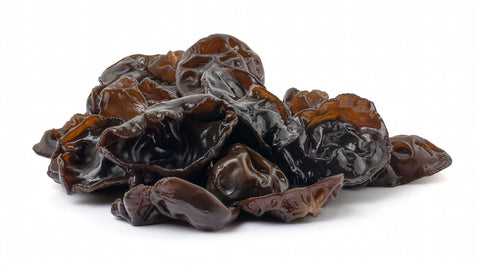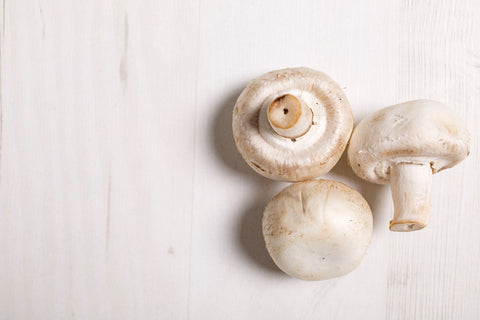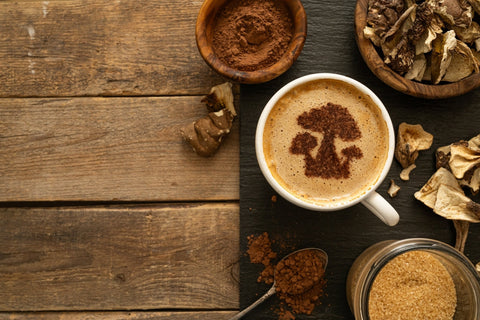What makes the black fungus mushroom a stand-out ingredient in both Asian kitchens and traditional medicine cabinets? This week, we dive headfirst into The Health Benefits of Black Fungus Mushrooms—spotlighting the latest research, nutritional insights, and the essential facts you need to know.
Unlocking the Mysteries of Black Fungus Mushrooms
Black fungus mushrooms, also known as wood ear mushrooms or by their scientific name, Auricularia species, have earned a longstanding reputation in Asia. But what exactly gives them their superfood status? The answer lies in their unique blend of nutrition and potent bioactive compounds—a combination promising a host of potential health perks [5].
While black fungus appears in stir-fries and soups across China, Japan, and other neighboring countries, excitement about this humble mushroom is quickly spreading to the rest of the world. Join us as we explore the evidence behind the claims, unpacking both the science and the ancient wisdom.
For context on other functional mushrooms with superfood status, see The Health Benefits of Mushrooms: A Quick Overview.
Bursting With Antioxidants: The Powerhouse Defense
First up in the lineup of potential benefits: antioxidants. Black fungus mushrooms are rich in compounds like polyphenols, which are designed to shield our cells from oxidative stress [5].
Why does this matter? Oxidative stress acts like rust within our bodies. Over time, it can accelerate aging, drive up inflammation, and set the stage for chronic conditions such as heart disease and cancer [5].
While these effects are well-documented in test tubes and animal studies, researchers are enthusiastic about the potential benefits for people as well. Add black fungus to your plate, and you may be giving your system an extra boost to fight back against daily wear and tear.
Looking to maximize antioxidant intake with mushrooms? Check out the unique compounds in Chaga.
Heart Health Hero: Lowering Cholesterol and Boosting Circulation
Love your heart? Black fungus mushrooms might love it just as much. Research points to their ability to lower cholesterol levels, help keep your blood pressure in check, and reduce your risk of heart disease [1] [5].
The reason? It's a one-two punch: the fiber naturally present in each cup of black fungus binds to cholesterol, escorting it out of your system, while key minerals like potassium help relax blood vessels and support steady blood pressure [1] [5].
On top of that, the bioactive compounds in black fungus may keep inflammation in check, a significant factor in cardiovascular disease [1].
It's no wonder black fungus has found a home in recipes for people aiming to take care of their ticker.
Explore how other mushrooms, like Shiitake, benefit cardiovascular health.
Supercharged Immunity: How Black Fungus Supports Your Defenses
Navigating cold and flu season? Black fungus mushrooms bring a secret weapon: beta-glucans and other prebiotics [1] [5].
These compounds stimulate white blood cell production—the immune system's frontline defense—and fine-tune your body's overall response to infection. Think of black fungus as an everyday way to support your immune system, potentially making you better prepared to fend off bugs and viruses [1] [5].
Research is ongoing, but the centuries-old use of black fungus as a "restorative" ingredient in traditional medicine is compelling and well-respected.
Other mushrooms celebrated for their immune-boosting properties include Turkey Tail and Maitake.
Digestive Health: Happy Gut, Happy You
Move over, oat bran—black fungus mushrooms can be a massive source of fiber, providing up to 20 grams per cup [1] [3] [4] [5].
That means two things for your digestion:
- Bowel regularity: The generous fiber acts as a broom, sweeping out waste and preventing constipation.
- Gut-friendly bacteria: By nourishing your beneficial gut microbes (thanks to prebiotics), black fungus helps maintain a balanced, happier digestive system [1] [3] [4] [5].
The upshot: if tummy troubles are a concern, a helping of black fungus might be just what the digestive doctor ordered.
Interested in other foods and drinks that may support digestion? Learn about mushroom coffee and gut health at Does Mushroom Coffee Make You Poop.
Stabilizing Blood Sugar: A Secret Ally for Your Pancreas
Keeping blood sugar in balance is crucial for everyone—not just diabetics. The fiber and special bioactive compounds in black fungus work together to slow the speed at which your body absorbs sugars from a meal [2].
The result? Fewer wild spikes and crashes, and less stress on your pancreas.
For anyone concerned about prediabetes or metabolic health, incorporating black fungus into meals regularly could be an easy and delicious habit to support steadier energy levels.
Natural Anti-Inflammatory: Cooling the Fires Within
Chronic inflammation is the root cause behind countless modern diseases, including heart disease, diabetes, and even depression. Good news: black fungus mushrooms are rich in anti-inflammatory compounds that help cool down these internal "fires" before they spark bigger issues [1].
Scientists are still decoding which specific molecule does what, but early evidence suggests a promising protective effect, especially when black fungus is a staple in the diet.
For a deep dive into mushrooms renowned for calming inflammation and stress, see Reishi’s benefits.
Cognitive Care: Nourishing the Brain
Could eating mushrooms help keep your mind sharp as you age? There’s growing interest in how foods like black fungus may reduce the risk of cognitive decline and diseases such as Alzheimer’s [3].
The antioxidants and unique polysaccharides in black fungus are believed to support brain health by reducing inflammation and combating oxidative stress, both of which can damage brain cells over time.
It's not a miracle cure, but adding black fungus to the menu may be a simple step toward a healthier, clearer mind.
For more on mushrooms and brain function, check out Lion’s Mane.
Preventing Iron Deficiency and Fatigue
Did you know? Black fungus mushrooms are naturally high in iron, a crucial mineral for oxygen transport and energy [3].
This makes them a potent ally for those at risk of anemia, particularly seniors, vegetarians, and anyone who struggles with chronic tiredness. By enjoying black fungus regularly, you’re helping keep fatigue and brain fog at bay.
Brightening Skin and Supporting Youthfulness
Healthy skin starts from within, and black fungus delivers a duo of vitamin D and antioxidants to nurture glowing, resilient skin [1].
Vitamin D helps the body create and preserve collagen—the protein that keeps skin plump and smooth—while antioxidants help slow the skin-aging process by fighting off damaging free radicals.
The result? A potential dietary boost to your skin's natural defenses against the effects of time and the environment.
Feeling Full, Weighing Less
If you're watching your waistline, here's great news: the fiber and modest protein content in black fungus can keep you feeling satisfied longer [1].
By promoting satiety (that wonderful feeling of being comfortably full), black fungus might help curb overall calorie intake, making weight management feel less like a struggle and more like a flavor-packed adventure.
Promoting a Healthy Liver
Exciting new science is investigating whether black fungus mushrooms can protect the liver from damage. Early studies in animals and a handful of human trials suggest potential benefits, including the protection of liver cells and enhanced organ detoxification capabilities [5].
While it’s too soon for firm recommendations, black fungus could eventually join other foods admired for their gentle support of liver health. If your goals include optimal detox, it’s a tasty ingredient to watch.
A Note on Safety and Research Gaps
It's essential to note that most of the boldest health claims about black fungus mushrooms originate from traditional uses, laboratory studies, or animal research, rather than extensive, gold-standard human studies [5].
That means while we know black fungus offers real nutritional benefits—fiber, prebiotics, vitamins, and minerals—the precise effect on human health is still being unraveled [5].
Who should be careful?
- Anyone with allergies to mushrooms.
- Individuals with blood clotting disorders or those on blood thinners, since black fungus contains compounds that can gently thin the blood.
Until more is known, as with any functional food, moderation and variety are key.
The Bottom Line: Why Add Black Fungus Mushrooms to Your Plate?
Black fungus mushrooms pack a nutritional punch: fiber, antioxidants, prebiotics, vitamin D, iron, potassium, and other key bioactive compounds—all well established in both the culinary and traditional medicine worlds [1] [3] [5].
From supporting your heart and immunity, to keeping your brain and digestion running smoothly, to possibly improving skin and weight balance, there are plenty of reasons why black fungus mushrooms deserve a spot on your shopping list.
Just remember: while the evidence so far is promising, we’re only at the start of understanding the full potential of this fascinating mushroom. As science catches up with centuries of tradition, your taste buds—and your wellbeing—may thank you for giving black fungus a try.
If you want to explore the benefits and science of other functional mushrooms, check out our quick overview at The Health Benefits of Mushrooms: A Quick Overview.
References
-
[1] https://www.
freshelementsrestaurant.com. np/can-we-eat-black-fungus- everyday/ -
[2] https://former-students.
imperial.edu/084-Memoir/ article?dataid=KWH35-9440& title=black-fungus-health- benefits.pdf -
[3] https://www.yuanzhentrading.
com/blogs/10-surprising- health-benefits-of-dry-black- fungus-you-need-to-know -
[4] https://chefcoca.com/blogs/
food-service-equipment- resources/black-fungus- nutrition-benefits-and- recipes-for-a-healthy-diet -
[5] https://www.healthline.com/
nutrition/black-fungus


